#as byatt
Text
The writer and critic AS Byatt, who explored family, myth and narrative in a career spanning six decades, has died aged 87. Her publisher Chatto & Windus confirmed that she died peacefully at home surrounded by close family.
Dame Antonia Susan Duffy, who wrote under the name AS Byatt, authored complex and critically acclaimed novels, including the Booker prize-winning Possession and her examination of artistic creation, The Children’s Book. Over her career, she won a swathe of literary awards, from the Booker to a Chevalier of France’s Order of Arts and Letters.
“We mourn her loss but it’s a comfort to know that her penetrating works will dazzle, shine and refract in the minds of readers for generations to come,” said her publisher Clara Farmer.
29 notes
·
View notes
Text

The novelist AS Byatt, who has died aged 87, was throughout her existence a victim of Samuel Johnson’s “hunger of the imagination that preys incessantly upon life, and must be always appeased by some employment”. In the words of one of her own heroines, whatever in the moral abstract she thought about the relative importance of writing and life, nothing mattered to her more than writing.
Her first novel, Shadow of a Sun, appeared in 1964, the year after A Summer Bird-Cage, the first novel by her sister, Margaret Drabble, was published, thus establishing the notorious and possibly exaggerated rivalry between them. It was followed by studies of Iris Murdoch, of Wordsworth and Coleridge, and by another novel, The Game (1967). In 1972, she endured the death of her 11-year-old son, Charles, knocked down and killed by a car. The experience marked her deeply. She continued to teach and she sat on committees, but for a decade the creative springs were dried up in her. There is no compensation, she said to interviewers who asked about such compensations, for the death of a child – except that if you survive, you’re a bit tougher. But it taught her about the machinery of grief.
Her creative career started again in 1978 with The Virgin in the Garden, the first of what would prove to be a remarkable tetralogy of novels, and a long, complex narrative of a small community and its school in Yorkshire celebrating in the coronation year of 1953, the start of a new Elizabethan age.
To some extent the creation of fiction had become necessary to her as a complement (or antidote) to her teaching work at University College London, as a kind of private gesture against an excessively theoretical academic environment. It was evident, she wrote acerbically, that what writers there were in the 1970s were not coming out of English departments: it therefore seemed better not to go into one.
The Virgin in the Garden was well received, and was followed by Still Life (1985), which included the chance death by electrocution of one of the main characters from the first novel, and an emphasis on the accidental element in human life and death.
Her reputation (until then, that of a literary novelist with slightly intimidating intellectual qualifications) was transformed by the publication in 1990 of Possession, which was to win the Booker prize and become a slightly surprising bestseller worldwide, and, in 2002, a film.
A rich and capacious combination of 19th-century letters, poems, fables and journals, all contained within the apparently orthodox setting of a modern literary detective novel, it was the book in which her exhilarating genius at last came into its own. Publishers in Britain and America, who had contemplated in appalled respect the prospect of selling a novel containing large swatches of pastiche Victorian poetry, were triumphantly refuted when sales of the book – even before the award of the Booker and Aer Lingus prizes – soared. It had seemed until then, to quote one review, that her fiction was to be characterised by a luminous bookishness that stayed artistically inert.
She was a self-confessed intellectual, and this earned her a bad press in a country in which the word was a term of denigration. Possession elbowed this image aside by adding vitality and comedy to literariness, and excitement to erudition. The wells that had been sealed up for so long were now flowing with unexpected abundance.
The book brought together elements in her background that had lain fallow until then, and provided pointers to the way her writing was to develop in the future. In it, in an extraordinarily rich mixture, are to be found her fascination with Victorian fiction and poetry, her childhood absorption in myths and fairytales, her interest in the sheer mechanics of storytelling; in it also are to be found her insatiable thirst for knowledge, her love for subtlety and complication in her plots, an increased assurance in her use of humour, her satiric view of the more exploitative aspects of the academic industry, and her growing mistrust of literary biography as a genre – described by her as “a bastard form, a dilettante pursuit”. This mistrust was something she was to explore more extensively in a later novel, The Biographer’s Tale (2000).
The publication of Possession released an unbelievable flow of creativity. Books came bursting out, notably Angels and Insects (1992), which was filmed in 1995, and, later, The Children’s Book (2009), shortlisted for the Booker. “I think I wrote them in a kind of joie de vivre about being a full-time writer instead of walking through the streets thinking about students and lectures,” she said.
Another aspect of her talent that was unexpectedly unleashed during the 1980s and 90s was the short story. It is rarely the case that writers who are at ease in what has been described as the big baggy novel are also adept in this very different and extremely demanding form.
Byatt was able to cope with equal ease with the 2,000-word story and the 20,000-word novella. Her first collection, Sugar and Other Stories (1987), dealt with bereavement, ghosts, memories of her childhood, her father; in it, for the first time, she wrote in The July Ghost, a story based on her own grief at the loss of her son. It was a kind of clearing of the decks. Later stories carried on from where Sugar left off, building on the concentrated, painterly and tactile prose she had developed there.
One of the most typical was A Lamia in the Cévennes, written for the British Council’s New Writing series. In it, a painter who has abandoned London for the Cévennes mountains of southern France finds a lamia – a mythological creature, closely modelled on Keats’s lamia (a “palpitating snake… Her head was serpent, but, ah, bitter-sweet! She had a woman’s mouth with all its pearls complete.”) – in his swimming pool. This pool bears a striking resemblance to the one Byatt had built for her house in the village of Avèze in that region with the prize money from Possession; the hero is trying to capture the different blues and different surface planes that his pool confronts him with:
He muttered to himself. Why bother. Why does this matter so much. What difference does it make to anything if I solve this blue and just start again. I could just sit down and drink wine. I could go and be useful in a cholera-camp in Colombia or Ethiopia. Why bother to render the transparency in solid paint or air on a bit of board? I could just stop.
He could not.
He tried oil paint and acrylic, water-colour and gouache, large designs and small plain planes and complicated juxtaposed planes. He tried trapping light on thick impasto and tried also glazing his surfaces flat and glossy, like seventeenth-century Dutch or Spanish paintings of silk. One of these almost pleased him, done at night, with the lights under the water and the dark round the stone, on an oval bit of board. But then he thought it was sentimental. He tried veils of watery blues on white in water-colour, he tried Matisse-like patches of blue and petunia – pool blue, sky blue, petunia – he tried Bonnard’s mixtures of pastel and gouache.
His brain hurt, and his eyes stared, and he felt whipped by winds and dried by suns.
He was happy, in one of the ways human beings have found in which to be happy.
It was her way too. Her love of the fine arts was deep and scholarly, and is apparent throughout her work, most notably in her Portraits in Fiction (2001) and Peacock and Vine (2016), on William Morris and the designer Mariano Fortuny.
Born in Sheffield, Antonia was the eldest child of John Drabble, KC and judge, and his wife, Marie (nee Bloor). She described her childhood as having been greatly blessed by very bad asthma, and when later in life she came to read Proust, she recognised certain things in him – “a contemplative, acute vision, induced by keeping very still in order to be able to breathe, a sense of living most fiercely in the mind, or in books, which were a livelier life”. If she was fortunate in her asthma, she was also fortunate in belonging to a family that took books and reading for granted.
She remembered three colouring books that she was given at the age of four, each with a page of poetry beside a picture. The poems were The Pied Piper and Tennyson’s The Lady of Shalott and Morte d’Arthur, and she quickly had all three by heart, a suitable foundation for a writer who was to be so influenced by the Victorian age. Later, she lost herself in a tangled maze of myths, folktales, legends and fairy stories, and found in them another world beyond the (to her) limited and boring world of childhood. Most importantly, she quickly recognised and understood the vital importance of storytelling.
Her early immersion in myth found its outlet much later in her career, when she was invited to contribute to Canongate’s series of retellings of ancient myth. Her own novels, as she pointed out, had threads of myth in their narrative that were an essential part of their form.
It was inevitable that, in choosing which to retell, she should turn back to one of the most influential books her mother had given her in her childhood, Wilhelm Wägner’s Asgard and the Gods, and rewrite Ragnarök (2011), “the myth to end all myths, the myth in which the gods themselves were all destroyed”. Written in the persona of a child living in a time of world war, when human beings seemed bent on destroying the world they had been born into, it provided ample ammunition for metaphor and irony, as well as some beautiful writing: “Wind Time, Wolf Time, before the World breaks up. That was the time they were in.”
The second world war very soon removed her father temporarily from her daily life. However, her mother, who had been an early graduate of the English school at Cambridge but had been forced to give up teaching when she married, took it for granted that children needed to be supplied constantly with poetry and with books.
Life in the Drabble household was something of an intellectual hothouse with a highly competitive element: all four children were expected to excel. Antonia and Margaret’s younger siblings, Helen and Richard, became, respectively, an art historian and a KC.
Antonia was educated at Sheffield high school and the Mount school, York, and later at Newnham College, Cambridge, where she took first-class honours in English, at Bryn Mawr College, Pennsylvania, and at Somerville College, Oxford.
In 1959, she married Ian Byatt and had a son (who died in the accident) and a daughter; in 1969, they divorced, and she married Peter Duffy, with whom she had two daughters. She taught in the extramural department of London University (1962-71) and the Central School of Art and Design (1965-69), and in 1972 became full-time lecturer in English and American Literature at UCL (senior lecturer in 1981). She left the college in 1983 to write full time.
She was conscientious in taking on administrative chores that many writers baulked at, and gave service on many committees, notably the Kingman committee on English language (1987-88). But the appointment that perhaps fed most directly into her interests was on the board of the British Council and its literature advisory panel.
Throughout her career she was, like many writers, a tireless traveller; unlike some, she was generous in acknowledging the benefits she gained from her travels, which she undertook not just to sell herself, but to learn from other writers and readers. She began writing short stories, she said, because of lectures she was given about the superiority of the short form by writers in China and Russia. But her interests were essentially and intrinsically European, and her intimate knowledge of European literature, past and present, also fed into her work.
She could read easily in many languages, which made her a natural choice as a judge of the first European literature prize, when it was established in 1990; it was while reading for it that she discovered the work of writers such as Roberto Calasso, Javier Marías and Bernardo Atxaga, for whom she formed a lasting enthusiasm, and did much to enhance their reputation in Britain.
She was also remarkable for her generosity to younger writers. At a stage of her career when she might well have been excused for finding her own professional commitments a sufficiently heavy workload, she read new work voraciously. Her floorboards cracked under the load of novels and poems sent to her by writers and publishers who valued her approval far above that of reviewers. She could not possibly have read all of them, but she read an astonishing number.
She was appointed CBE in 1990 and made a dame in 1999. Devoted to her family, she was much absorbed in the future of her children and grandchildren. But beyond every other attribute, she had a genius for friendship. In this relationship, all her qualities came to the fore: her imagination, her creativity, her ability to communicate, her steadfastness, and above all her generosity.
She is survived by her husband and daughters, Antonia, Miranda and Isabel.
🔔Antonia Susan Byatt, writer, born 24 August 1936; died 16 November 2023
Daily inspiration. Discover more photos at Just for Books…?
9 notes
·
View notes
Text
February 2023 Reading Wrap-Up
I read eight (8) books in February, which I am happy about, since Feb. is such a short month. I enjoyed most of the books I read, with genres that include fantasy, mythology, historical fiction, and others.
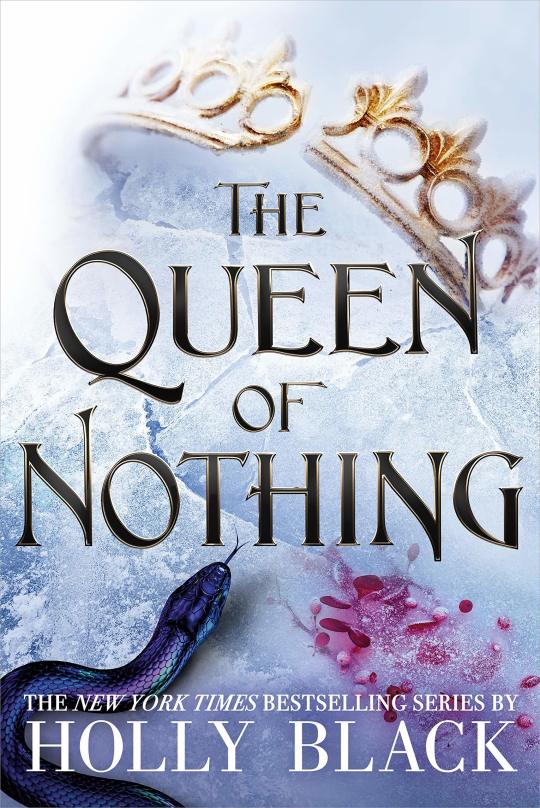
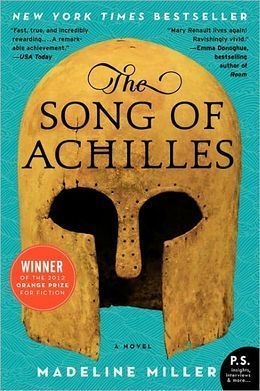
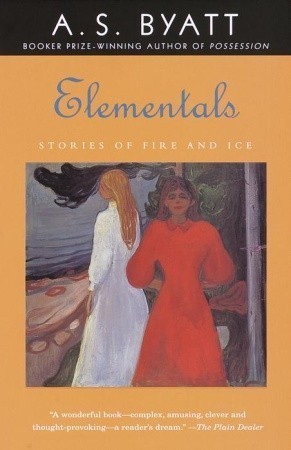
1.The Queen of Nothing by Holly Black (The Folk of the Air #3) 4/5 stars. I reread this on audio, and as with the first two books, I really enjoyed my reread of this series. I think these books are so much fun, and they were perfect to listen on audio. YA fantasy, audiobook
2.The Song of Achilles by Madeline Miller 5/5 stars. I can't believe it's taken me this long to finally read this book. I deeply enjoyed this book, the writing, and the story. It broke my heart, even thought I knew what was going to happen. Mythology retelling, lgbt.
3.Elementals: Stories of Ice and Fire by AS Byatt. 3/5 stars. This is another one of Byatt's short story collections, which each story having some sort of fire/ice theme. I enjoyed some stories better than others. Literary Fiction/Speculative Fiction
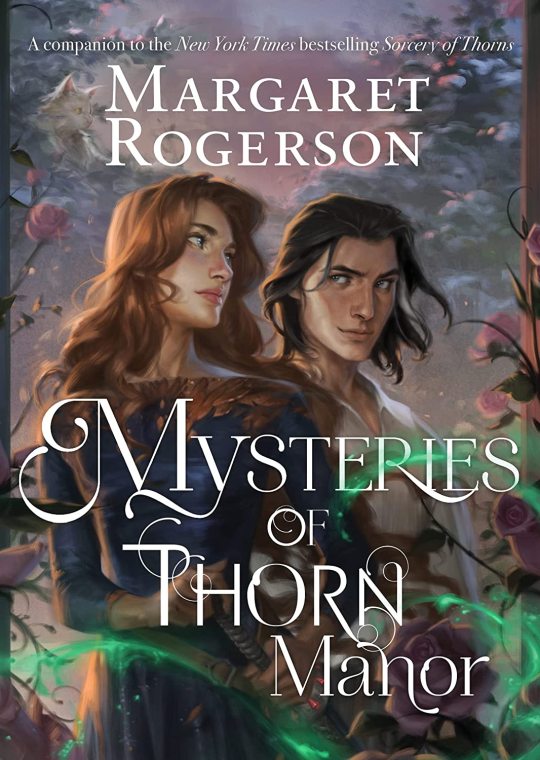

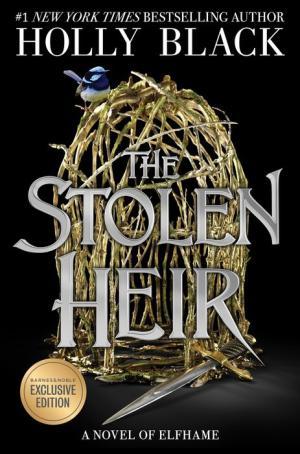
4.Mysteries of Thorn Manor by Margaret Rogerson. 4.5/5 stars. This is the Sorcery of Thorns novella that recently came out. This was so cute and so much fun, and was a nice to visit the characters again from Sorcery of Thorns.
5.Kaikeyi by Vaishnavi Patel. 4/5 stars. This is a retelling of the Hindu epic, The Ramayana. I read The Ramayana for a class in college, so I was a little familiar with the story already. I enjoyed this book a lot more than I thought it would, and it had a lot of stuff that I really like in books. Ace main character, Court politics, character driven story, characters trying to make the world a better place. However, it seems like Hindu community is rather split on this book. Mythology Retelling.
6.The Stolen Heir by Holly Black. 4/5 stars. This was such a good continuation of a beloved series. It played into the strengths of what made tfota so good, but also delivered fresh new settings, characters, and plots. Holly Black knows how to stick an ending, and I can’t wait for book 2! YA fantasy.
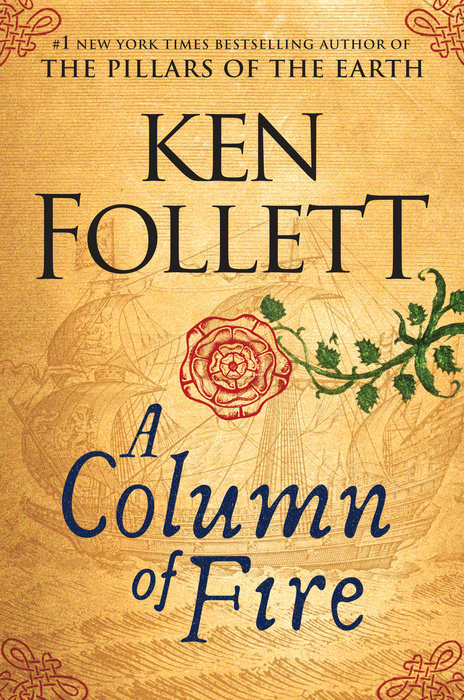
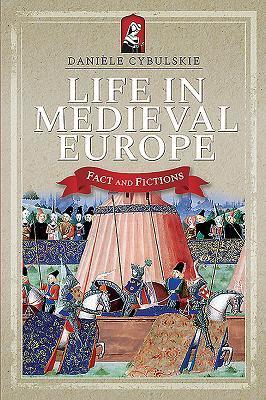
7.A Column of Fire by Ken Follett (Kingsbridge 3) 3/5 stars. Not quite as good/enjoyable as the other Kingsbridge novels, but still very entertaining. This one takes place in the late 1500s, surrounding Queen Elizabeth and the French court. Lots of politics and the major historical events of this time period. Definitely a little different in scope/approach than the first two books. Historical Fiction.
8.Life in Medieval Europe: Fact and Fiction by Daniele Cybulskie 4/5 stars. I've been listening to Daniele Cybulskie's podcast- The Medieval Podcast- for several years, and I've been meaning to pick up some of her books. I thought this was a great little book debunking common stereotypes about the middle ages. This did a good job of introducing topics clarifying common misconceptions. Non-fiction.
3 fantasy, 2 mythology retellings, 1 lit fiction, 1 historical fiction, 1 nonfiction.
March reading goals:
A Day of Fallen Night by Samatha Shannon
The Adventures of Amina al-Sirafi by Shannon Chakraborty
Expanse #7 by James SA Corty
The Evening and the Morning by Ken Follett
The Last Tale of the Flower Bride (if I can get the audiobook)
Velvet was the Night by Silvia Moreno Garcia
Legendborn by Tracy Deon (?)
A nonfiction
#February Reading Wrap Up#reading wrap up#books#fantasy books#the queen of nothing#holly black#the stolen heir#the song of achilles#madeline miller#mysteries of thorn manor#margaret rogerson#as byatt#kaikeyi#vaishnavi patel#a column of fire#ken follett#daniele cybulskie#my post
37 notes
·
View notes
Text
Must a movie be good? Can it not simply be about solitude and love and academia and narrative? And Tilda Swinton and Idris Elba telling each other stories in a hotel room? And have a credit for octopus wranglers?
#so i finally saw#three thousand years of longing#which is not a good film per se#but is a film designed to hit me right in the intellectual id#despite the orientalism#and the fatphobia#and the cinematic assumption that academic conference keynotes are basically ted talks#it does not transcend its 1990s roots#and yet it still has its attractions#namely narratologist tilda hearing the life story of djinn idris and interjecting with 'oh yes that's a common trope that never ends well'#george miller#as byatt#tilda swinton#idris elba
6 notes
·
View notes
Photo
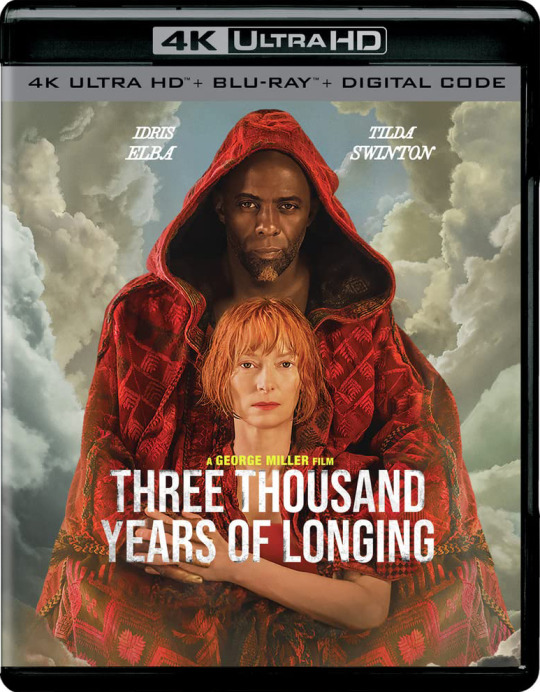
Three Thousand Years of Longing will be released on 4K Ultra HD, Blu-ray, and DVD on November 15 via Warner Bros. The 2022 fantasy-drama film is currently available on VOD.
George Miller (Mad Max, Mad Max: Fury Road) directs from a script he co-wrote with Augusta Gore, based on A.S. Byatt's 1994 short story "The Djinn in the Nightingale's Eye." Idris Elba and Tilda Swinton star.
No special features are included.
youtube
Dr Alithea Binnie (Tilda Swinton) is an academic, a creature of reason. While in Istanbul, she happens to encounter a Djinn (Idris Elba) who offers her three wishes in exchange for his freedom. At first, she doubts that he is real and she knows all the cautionary tales of wishes gone wrong. But the Djinn pleads his case, and eventually she is beguiled and makes a wish that surprises them both!
Pre-order Three Thousand Years of Longing.
#three thousand years of longing#3000 years of longing#idris elba#tilda swinton#george miller#augusta gore#a.s. byatt#as byatt#dvd#gift#fantasy#mad max#mad max fury road#mad max: fury road#djinn
20 notes
·
View notes
Text
"You are safe with me."
"I am not at all safe with you. But I have no desire to be elsewhere."
---A.S. Byatt/Possession
9 notes
·
View notes
Text
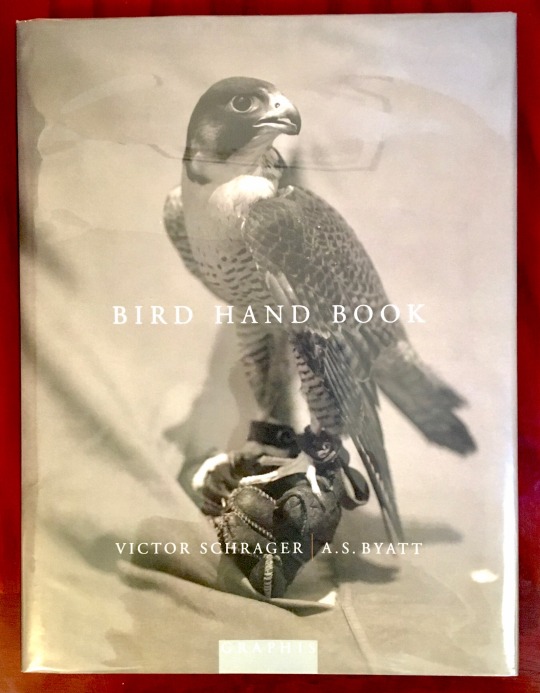
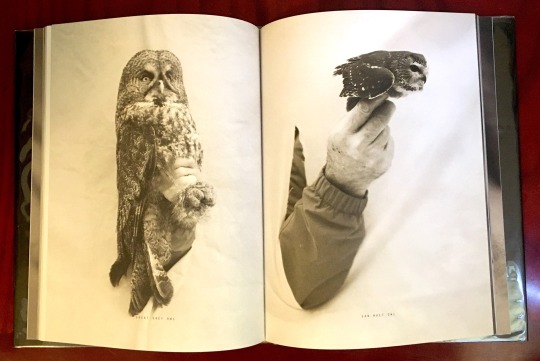
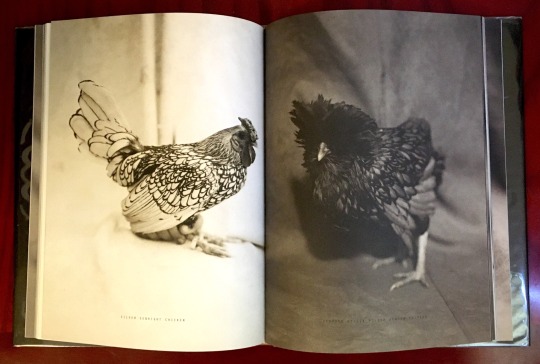
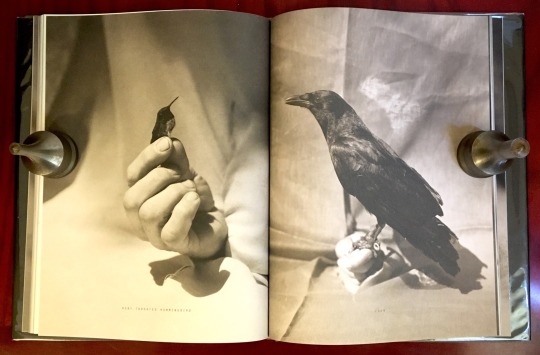

Book 464
Bird Hand Book
Photographs by Victor Schrager / Text by A.S. Byatt
Graphis Inc. 2001
Published in 2001, Bird Hand Book features Victor Schrager’s (b. 1950) lovely photographs of over 100 species of birds in the hands of ornithologists. Taken over a span of seven years, Schrager’s platinum prints reveal an interesting kind of relationship between the birds and their handlers. In many shots, the human hand becomes a pedestal with the bird resting peacefully, trusting and calm, while in others the birds are tightly held, perhaps calmed by the firm embrace, prevented from moving. The overall effect is almost like being presented with a series of still lifes, capturing a moment of union between strangers. With an enlightening essay by esteemed novelist A.S. Byatt and beautifully designed, this book is an engaging and intimate look at our fascination and relationship with our feathered neighbors.
#bookshelf#illustrated book#library#personal library#personal collection#books#book lover#bibliophile#booklr#bird hand book#as Byatt#Victor schrager#graphis#photography
4 notes
·
View notes
Video
youtube
Three Thousand Years of Longing Trailer
Tilda Swinton and Idris Elba star MGM’s Three Thousand Years of Longing is based on A.S. Byatt’s short story “The Djinn in the Nightingale’s Eye.” The film is directed by George Miller from a screenplay by Miller and Augusta Gore.
Alithea Binnie (Swinton) takes a trip to Istanbul where she buys a bottle. Said bottle contains a djinn (Elba) who offers her three wishes. As Binnie notes, though, “There is no story about wishing that is not a cautionary tale.”
Three Thousand Years of Longing hits theaters in Summer 2022.
#three thousand years of longing#tilda swinton#idris elba#george miller#augusta gore#as byatt#djinn in the nightingale's eye#mgm#3000yearsoflonging#TGCLiz
2 notes
·
View notes
Text
Has anyone got a book they read time ago but know that they should reread and that it will have a different but just as epic impact on their life? For me it’s Possession by AS Byatt and The Magus by John Fowles
0 notes
Text
"I began this writing task at the suggestion of my cousin, the poet, Christabel LaMotte, who said something that struck me most forcibly. 'A writer only becomes a true writer by practising his craft, by experimenting constantly with language, as a great artist might experiment with clay or oils until the medium becomes second nature, to be moulded however the artist may desire.' She said too, when I told her of my great desire to write, and the great absence in my daily existence of things of interest, events or passions, which might form the subject matter of poetry or fiction, that it was an essential discipline to write down whatever there was in my life to be noticed, however usual or dull it might seem to me. This daily recording, she said, would have two virtues. It would make my style flexible and my observation exact for when the time came--as it must in all lives--when something momentous should cry out--she said 'cry out'--to be told. And it would make me see that nothing was in fact dull in itself, nothing was without its own proper interest. Look, she said, at your own rainy orchard, your own terrible coastline, with the eyes of a stranger, with my eyes, and you will see that they are full of magic and sad but of beautifully various color. Consider the old pots and the simple strong platters in your kitchen with the eyes of a new Ver Meer come to make harmony of them with a little sunlight and shade. A writer cannot do this, but consider what a writer can do--always supposing the craft is sufficient."
"Possession" by A.S. Byatt
1 note
·
View note
Text
I really love Aaron eckhardt and I love this movie but he is just not right for it 😞
0 notes
Text
A.S Byatt’s books got a cover redesign and look how pretty


#the childrens book- with the ferns and dragonfly 😍#Babel tower with the snail shell#I want all of these#as Byatt#possession#the childrens book
80 notes
·
View notes
Text

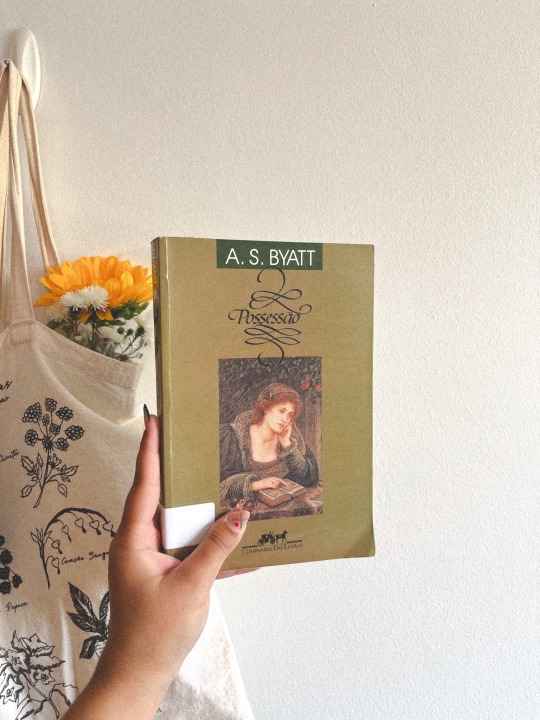
sunflower & next read
#booklr#books#book photography#a. s. byatt.#possession#books and flowers#sunflowers#books in a bag#the refuge of books
221 notes
·
View notes